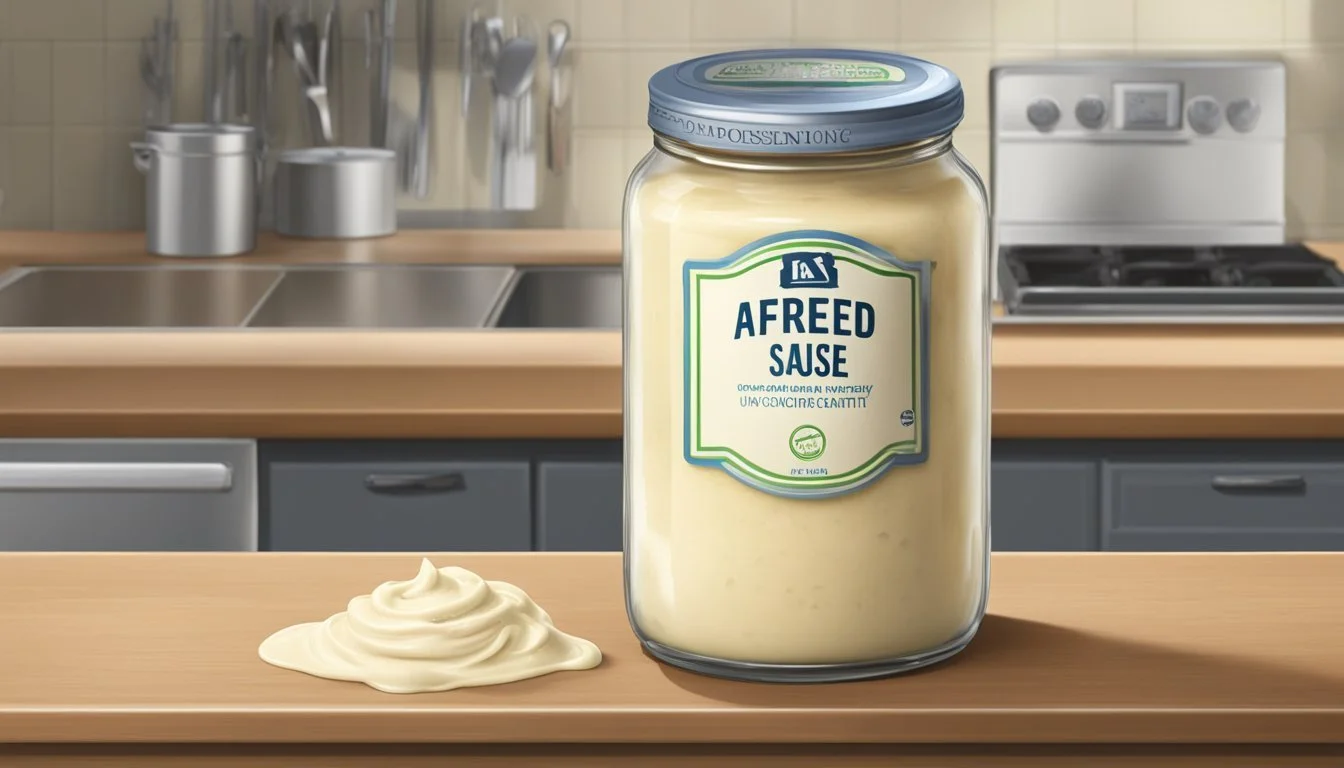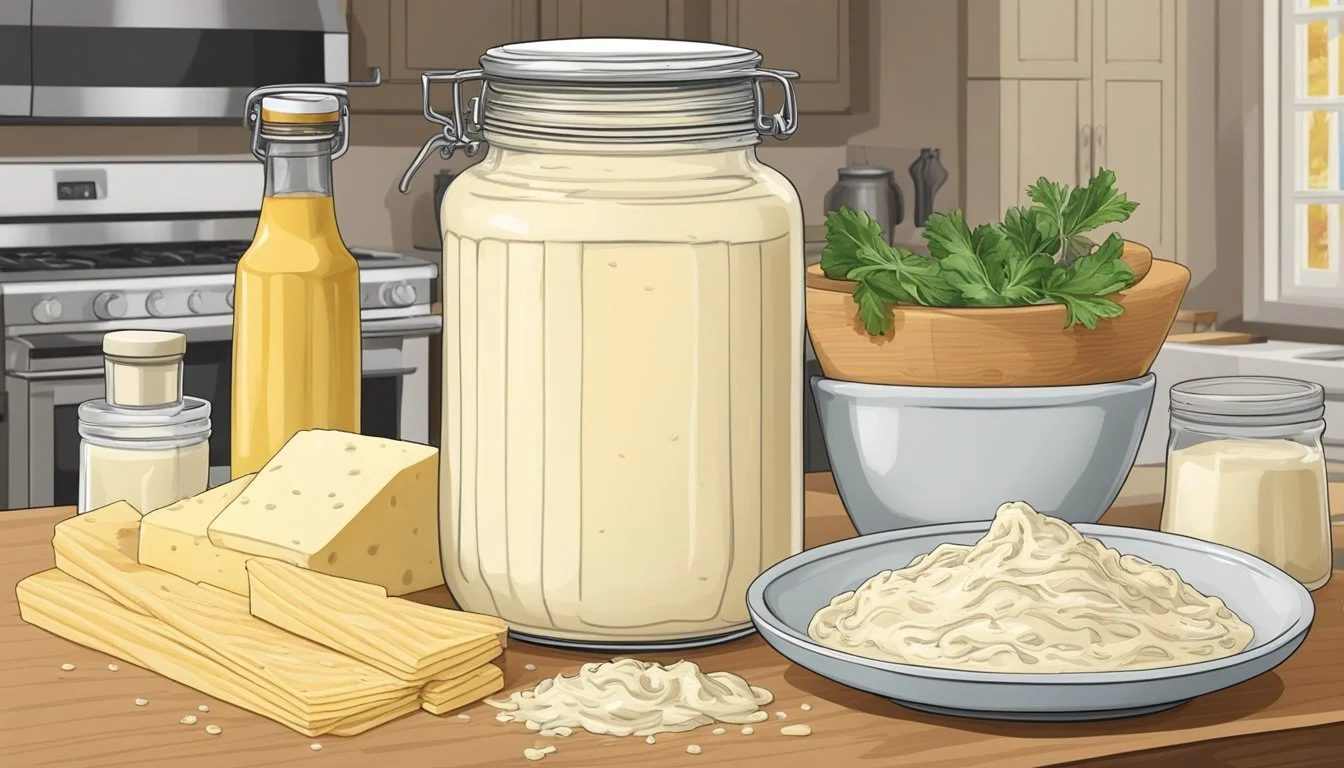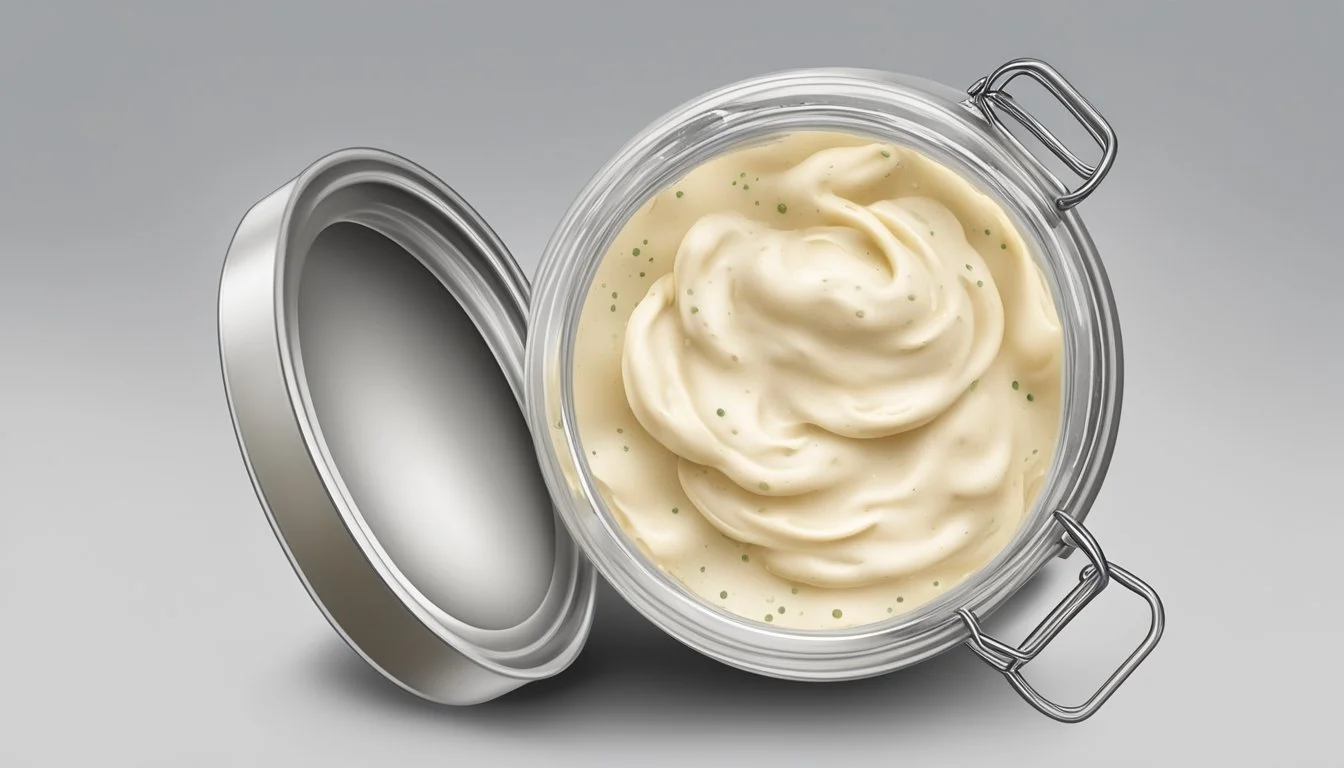Is it Safe to Consume Expired Alfredo Sauce?
Understanding Food Safety Risks
When it comes to the safety of consuming expired alfredo sauce, it is essential to understand the difference between "best by" and "use by" dates. These dates are guidelines for consumers regarding the peak quality of the product, not necessarily its safety. Alfredo sauce, a popular creamy pasta topping, typically contains dairy products that can spoil over time, so it's important to approach expired sauce with caution.
Alfredo sauce that has been properly stored and is past its expiration date might still be safe to eat, but there are signs to look for that indicate spoilage. The presence of mold, an off smell, or a change in texture can all be indicators that the sauce is no longer safe for consumption. Safety should always be paramount when deciding whether to eat expired food, and when in doubt, it is better to err on the side of caution and dispose of the sauce.
Although an unopened jar of alfredo sauce can remain safe to consume for a period beyond the expiration date, particularly if it has been stored in a cool, dry place, the quality may diminish. The sauce could lose its intended flavor, creamy texture, and might not perform as expected when used in recipes. Consumers should perform a thorough inspection of the alfredo sauce, checking for visual and olfactory signs of spoilage before deciding to use it.
Understanding Alfredo Sauce and Its Ingredients
Alfredo sauce is revered for its smooth, creamy texture and rich flavor, but to determine its safety after the expiration date, one must understand its composition and preservation.
Composition and Key Ingredients
Alfredo sauce is a beloved culinary creation commonly comprised of cream, cheese, and butter, with variations including garlic and herbs for flavor enhancement. Its simplicity belies the delicate balance required in its creation. The heavy cream provides a luscious base, melting into the sharp, tangy profiles of cheeses like Parmesan. The sauce may also contain stabilizers and preservatives to prolong shelf life.
Primary Ingredients:
Cream
Cheese (commonly Parmesan)
Butter
Common Additions:
Garlic
Herbs
Stabilizers and Preservatives
Shelf Life and Expiration Information
The shelf life of alfredo sauce hinges largely on its ingredients and storage conditions.
Type Refrigerated Shelf-Stable Ingredients Used Fresh dairy, minimal preservatives May include preservatives for extended shelf life Shelf Life Typically shorter Longer, but still subject to degradation Expiration Indicator Expiration Date labeled on the packaging Expiration Date labeled on the packaging
Alfredo sauce, once opened or homemade, should be consumed promptly and typically maintains peak quality when refrigerated and used within several days. Commercially packaged sauce can vary in quality preservation from 12 to 18 months from the manufacturing date, mainly due to added preservatives, which can extend its lifespan. After the expiration date, one should inspect the sauce for signs of spoilage such as a change in color, unpleasant odor, or mold.
Identification of Spoilage
When assessing the safety of expired Alfredo sauce, one must be vigilant in identifying signs of spoilage that render the product unsafe for consumption.
Visible Signs of Spoilage
Spoilage is often detectable through visible changes. If mold appears on the surface of the Alfredo sauce, it indicates a microbial invasion that has compromised the product. Similarly, discoloration, such as an unexpected darkening or development of spots, is a clear warning that the sauce should not be consumed.
Changes in Texture and Consistency
Alfredo sauce that has spoiled may exhibit alterations in texture and consistency. Fresh Alfredo sauce should be smooth and creamy. The presence of clumps or a watery separation within the jar suggests that the sauce's physical properties have changed, indicating spoilage.
Odors and Off-Putting Smells
A reliable method to detect spoilage involves the sense of smell. Fresh Alfredo sauce should have a mild, cheesy aroma. In contrast, an off smell, such as a sour or rancid scent, is a strong indicator that the sauce is past its prime and should not be used.
Health Implications of Expired Alfredo Sauce
When considering the safety of consuming expired Alfredo sauce, one must be cognizant of the potential health implications that can arise. Expired products, particularly those that are dairy-based like Alfredo sauce, can harbor bacteria and other pathogens leading to foodborne illnesses.
Foodborne Illnesses and Bacteria
Expired Alfredo sauce can become a breeding ground for bacteria such as Salmonella, E. coli, and Listeria. These pathogens can multiply over time, particularly if the product has been stored improperly or for an extended period past its expiration date.
Salmonella may cause symptoms like diarrhea, fever, and abdominal cramps.
E. coli infections can lead to severe stomach cramps, vomiting, and bloody diarrhea.
Listeria can result in high fever, severe headaches, stiffness, and nausea.
Individuals consuming products contaminated with these bacteria may experience foodborne illness, which can be particularly severe for the young, elderly, pregnant women, or those with weakened immune systems.
Risks of Consuming Spoiled Products
The consumption of spoiled Alfredo sauce can present several health risks including:
Mold Growth: Mold can produce mycotoxins, which are toxic compounds capable of causing illness.
Bacterial Growth: Beyond obvious bacteria, spoiled products can support bacterial endotoxins that persist even after cooking.
Allergic Reaction: Mold and other contaminants can trigger allergic reactions, with symptoms ranging from mild to severe.
Eating products past their expiration date can be risky, as the safety cannot be assured without proper testing. While not all expired products immediately become harmful, it is generally recommended to err on the side of caution to prevent possible health risks.
Best Practices for Storage
To ensure Alfredo sauce maintains its freshness for as long as possible, correct storage methods are essential. From proper refrigeration to understanding the signs of compromised quality, the following best practices are key.
Proper Storage Techniques
When storing Alfredo sauce, packaging plays a pivotal role in longevity. Whether homemade or store-bought, sauce should be kept in an airtight container to prevent contamination and preserve flavor. Store the container in a cool and dry place, away from direct sunlight and heat sources, before opening.
Unopened Shelf-Stable Sauce: Keep in a pantry or cupboard.
Homemade or Fresh Sauce: Place in the fridge in an airtight container immediately after cooling.
Refrigeration and Freezing Options
After opening, Alfredo sauce must be stored in the refrigerator to slow down bacterial growth. If the sauce won't be used within a few days, freezing can prolong its shelf life.
Refrigeration: Use within 1-2 weeks and keep below 40°F.
Freezing: Store in a freezer-safe container or bag, removing as much air as possible. Use within 6 months for optimal quality.
Indicators for Storage Quality
Regular checks for freshness are crucial. If an off smell or strange flavor develops, it's a clear indicator that the sauce may be spoiled, regardless of storage conditions. Examine the sauce for signs of mold or noticeable changes in color and consistency.
Visual Check: Look for mold or any unusual changes.
Smell Test: A foul or off odor means the sauce is no longer safe.
Evaluating the Safety of Expired Alfredo Sauce
When it comes to expired Alfredo sauce, consumers must make informed decisions based on the nature of expiration dates and a thorough examination of the product. It's crucial to differentiate between types of expiration labels and to understand when it's appropriate to exercise caution.
Deciphering Expiration Dates
Understanding expiration dates is essential for assessing the safety of an expired Alfredo sauce. A "Best By" date is not an absolute marker of safety but rather the manufacturer's estimate for peak quality. Food safety experts assert that many products remain safe to consume after this date, so long as they are stored properly. An unopened jar of Alfredo sauce kept in a cool, dark place may remain safe beyond this date, whereas one that has been opened should be refrigerated and typically consumed within 3-5 days to maintain safety and quality.
Professional Judgment and Precautions
If an individual is considering consuming expired Alfredo sauce, consulting a healthcare professional or a food safety specialist might provide added confidence in the decision. Employing one's own judgment is key, involving a visual inspection and smell test. The sauce should be free from mold, discoloration, or an off odor. If any of these signs are present, it indicates spoilage, and the sauce should not be consumed.
When to Discard Alfredo Sauce
Conversely, certain indicators necessitate the disposal of expired Alfredo sauce:
Visible mold or discoloration
Unpleasant odor
Unusual texture such as separation or curdling
Storage mishaps, such as a jar exposed to high temperature variations
Even if the sauce passes the initial inspection, individuals should remain vigilant for any unexpected changes in taste or texture during consumption and immediately discard any sauce that seems off.
Handling and Preparation Tips
When it comes to handling and preparation of alfredo sauce, ensuring safety and maintaining the sauce's quality are priorities. This involves proper techniques for both cooking and reheating.
Cooking with Alfredo Sauce
One should always start with fresh alfredo sauce when possible. If using a jarred alfredo sauce that has been opened, ensure it has been stored correctly in the refrigerator and is not past its use-by date. When cooking with alfredo sauce, bring it to a simmer over a moderate heat, avoiding a full boil to prevent separation or scorching. Stirring constantly is key in the cooking process to maintain an even consistency and prevent the sauce from sticking to the pan.
Reheating and Serving Recommendations
Reheating alfredo sauce should be done gently to retain its creamy texture. A double boiler method is ideal for reheating, as direct heat can cause the sauce to separate. If a double boiler is not available, one can reheat the sauce over low heat, stirring frequently. When serving reheated alfredo sauce, it should be steaming hot, which indicates that it has reached a temperature that can reduce the potential for harmful bacteria. It's crucial to consume the reheated sauce immediately and not to reheat the sauce multiple times as this can degrade its quality and safety.
Alternatives to Discarding Expired Sauce
While the safety of consuming expired Alfredo sauce is questionable, there are some creative ways to repurpose it without ingestion. These methods allow one to minimize waste and can be both culinary and non-culinary.
Culinary Uses for Expired Sauces
Expired Alfredo sauce, while not recommended for consumption, can sometimes serve as a base for a cooking lesson. A cooking instructor or food blogger may use it to demonstrate the differences in aroma, texture, and appearance compared to fresh sauce, enhancing the educational experience for their audience.
Recipe developers can utilize expired sauce for testing purposes. They might study the sauce's properties when past its prime to improve preservatives or packaging methods. However, it is imperative to ensure that the sauce is not consumed during these trials.
Non-Culinary Uses
Beyond the kitchen, expired Alfredo sauce can have non-culinary applications. For instance, they could be used as compost. Natural ingredients in Alfredo sauce can contribute to the composting process, adding nutrients to the soil when broken down properly.
Additionally, creative individuals or craft enthusiasts might find a use for the jars and packaging. Cleaned thoroughly, the containers of expired sauce can be repurposed for storing art supplies, kitchen organization, or as planters for small herbs and succulents.
Conclusion
When considering the safety of consuming expired Alfredo sauce, consumers must evaluate a few critical factors. First and foremost, inspection for spoilage is essential; any signs of mold, off-odor, or strange consistency warrant immediate disposal of the product.
For products past their expiration date, the degradation of quality is likely. Although the sauce may still be safe to consume, its peak quality, including taste and texture, may have diminished. If the taste or smell seems altered, the sauce should not be used—as this is indicative of spoilage.
Proper storage is a significant determinant of an expired sauce's safety. Alfredo sauce should be stored in a cool, dry place and once opened, kept refrigerated and used within the recommended timeframe. Unopened and adequately stored Alfredo sauce may remain safe past the date printed on the jar, but always with a cautious assessment before use.
Consumers should be aware that food products, including Alfredo sauce, have a provenance that includes a 'best by' or 'use by' date, serving as a guideline for optimal quality and safety. After these dates, the product may not maintain its intended standard for a quality pasta dish.
In summary, while expired Alfredo sauce might be safe if stored correctly, its quality cannot be guaranteed. Consumers should exercise caution and prioritize safety by erring on the side of discarding any questionable food items.






